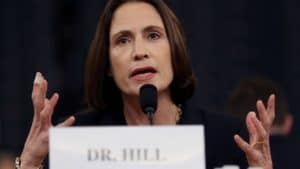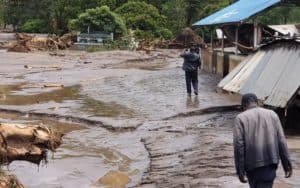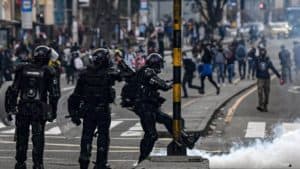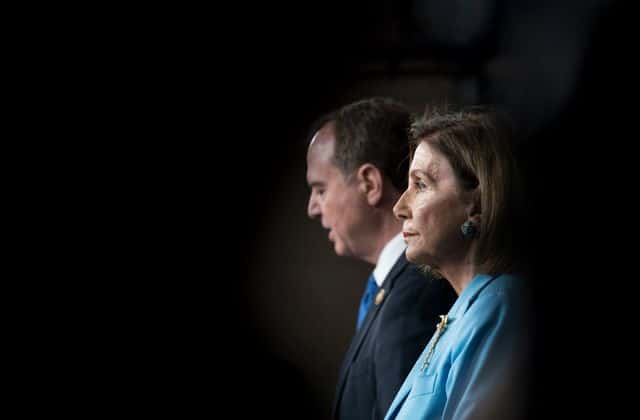The House has apparently concluded the investigative phase of the impeachment inquiry against Pres. Donald Trump. Senate Republicans met with White House officials on Thursday to discuss possibilities and strategies for the potential that articles of impeachment will be drafted and sent to trial.
Five days of public impeachment hearings provided thousands of pages in testimony from twelve witnesses with knowledge pertinent to the House’s investigation.
Ambassador Gordon Sondland, a witness who was requested by Republicans, reversed from previous testimony to acknowledge that a White House meeting with Trump was conditioned upon announcement of Ukrainian investigations into the Bidens.
“Was there a ‘quid pro quo?’ As I testified previously, with regard to the requested White House call and White House meeting, the answer is yes,” Sondland said.
Sondland claimed that he and other U.S. officials “worked with Mr. Rudy Giuliani on Ukraine matters at the express direction of the president of the United States,” adding that they “did not want to work with Mr. Giuliani.”
Sondland added that he was “absolutely convinced” that hundreds of millions of dollars in military aid to Ukraine was also delayed pending the announcement, which Trump allegedly insisted was to come directly from the Ukrainian president . He claimed to have never discussed the subject with Trump, but said he did discuss it with Vice President Mike Pence.
“Everyone was in the loop,” Sondland said, which Trump and Pence have denied.

Fiona Hill, President Trump’s former top Russia adviser, testifies that she had “a couple of testy encounters” with Ambassador Gordon Sondland over Ukraine.
However, Sondland’s testimony supports accounts from other witnesses who claim to have knowledge of the collaborative efforts by members of the Trump administration to extend a quid pro quo deal to Ukraine in order to secure an announcement of investigations. The desired result: political advantage against a potential opponent in the 2020 presidential election. On Tuesday, the White House tweeted a quote meant to discredit witness Lt. Col. Alexander Vindman, a US Army lieutenant colonel and National Security Council Ukraine specialist, during his public testimony. Trump has consistently ridiculed witnesses in the hearings and previously referred to Vindman as a “Never Trumper witness” on the same day of his closed-door testimony. After being named by numerous witnesses as a key player in the Ukraine quid pro quo plot, Giuliani warned he has “insurance” in case Trump tries to turn on him. “I’ve seen things written like he’s going to throw me under the bus,” Giuliani said. “When they say that, I say he isn’t, but I have insurance.” Following two weeks of public hearings, the inquiry is on break for Thanksgiving and will proceed in early December.
Round 5 in Democratic Primary Debates
On Wednesday night, the ten remaining candidates in the Democratic primary race met on the debate stage for the fifth time. Vice President Joe Biden continued his argument that he is simply the best candidate to beat Trump, though he fumbled by insisting domestic violence against women was an issue to keep “punching at.” He also claimed he has the support of the only black woman elected to the Senate, though Sen. Kamala Harris was standing on stage with him as a competitor. “That’s not true,” Harris quipped. “The other one is here.”

The 5th round of Dems Presidential debate
Sen. Elizabeth Warren defended her Medicare for All plan, as well as her plan for a wealth tax, from less progressive candidates. Sen. Bernie Sanders used his time to speak out against a rigged economy and the current healthcare system which prioritizes profits over people. Though Warren’s talking points have been comparable to Sanders, they do differ on their priorities. Sanders promised to introduce his own Medicare for All plan in his first week as president, as opposed to Warren who said her plan will take three years to actually take effect. Mayor Pete Buttigieg also defended himself against attacks from candidates who suggested he lacks experience. Buttigieg has recently emerged as a front-runner in some polls. The first nominating contest in the Democratic presidential primaries, the Iowa caucus, will take place in February.
Deadly Landslides in Kenya: At Least 29 Dead
Severe weather has triggered disastrous landslides in Kenya, killing at least 29 people, including seven children. In recent weeks, other countries along the eastern coast of Africa, such as Ethiopia and Somalia, and about 2.5 million people, have been affected by severe rainfall.
On, Saturday, the Kenya Red Cross reported “massive landslides” due to a “heavy downpour” and announced they were activating response teams. Severe weather conditions continue to make damage assessment difficult, but President Uhuru Kenyatta has released a statement acknowledging the “massive destruction of property” and ongoing rescue efforts.

Deadly Landslide bury villagers as rescues search for survivals
According to scientists, climate change is aggravating a weather phenomenon called the Indian Ocean dipole, which is comparable to El Niño in the Pacific Ocean. Specifically, as the western Indian Ocean warms and the eastern Indian Ocean cools, rainfall distribution is affected and intensified. Africa experiences severe flooding while Australia experiences severe drought and an increased risk of bush-fires. The Kenya Red Cross will provide updates on the devastation and rescue efforts through their Twitter account.
Protests Lead to Curfew in Colombia’s Capital
Friday night, the capital city of Colombia, Bogotá, was put under curfew after mass protests against President Iván Duque started on Thursday. Hundreds of thousands of Colombians marched in demonstrations demanding numerous things, namely protection for citizens and support for their rights by their president.

Colombia president orders curfew in the capital following unrest that has crippled the city Bogota
On Thursday and Friday, 146 people were detained during demonstrations and six people were killed in clashes between protesters and security forces, which also left hundreds of people injured.


